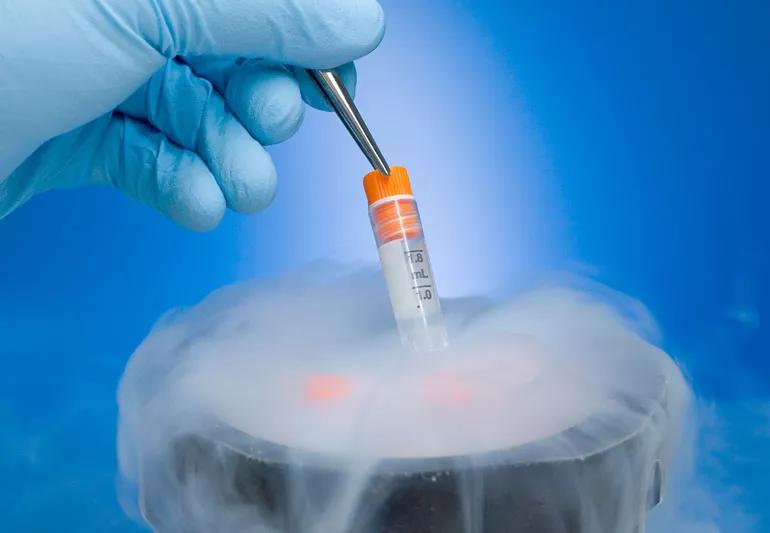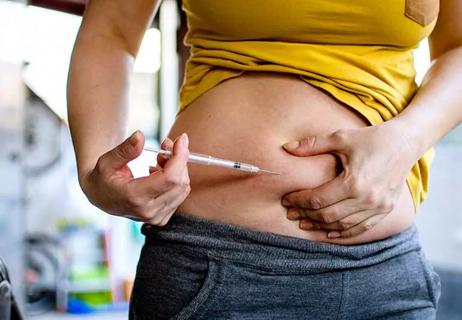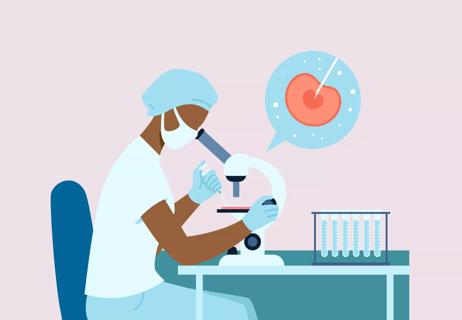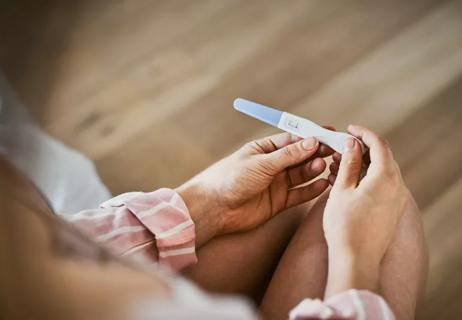Oocyte cryopreservation is a proven way to extend your fertility options for the future

If you think you want to have children someday, but now just isn’t the time, freezing your eggs is an option that can help preserve your fertility for the future.
Advertisement
Cleveland Clinic is a non-profit academic medical center. Advertising on our site helps support our mission. We do not endorse non-Cleveland Clinic products or services. Policy
Reproductive endocrinology fertility specialist Jenna Rehmer, MD, FACOG, explains how freezing your eggs works and what to take into consideration if you’re thinking about doing it.
On the whole, Americans are waiting longer than ever to have children, and many choose to freeze their eggs with the hopes of improving their chances of getting pregnant later in life.
“There are a number of reasons you might want to freeze your eggs,” Dr. Rehmer says, “but essentially, most of them can be boiled down to the fact that you’re not yet ready to achieve pregnancy in your current situation.”
Here are some of these reasons:
Advertisement
The process of freezing your eggs — technically known as oocyte cryopreservation — all starts with a visit to a fertility specialist, who’ll walk you through the process. Dr. Rehmer explains each step:
You’ll start with a consultation with a physician, typically a reproductive endocrinology fertility specialist. Through blood tests, they’ll assess the number of eggs you have (known as your ovarian reserve). They may order a sonogram or ultrasound, as well. U.S. Food and Drug Administration (FDA) regulations also require you to get an infectious disease screening for conditions like HIV and hepatitis B and C.
You’ll start a series of hormone injections that stimulate your ovaries and encourage multiple eggs to mature. During follow-up visits, your care providers will monitor the ovaries and eggs through ultrasound.
This part requires multiple doctor’s visits. “Let’s say you stimulate for 10 days,” Dr. Rehmer says. “During that timeframe, you might undergo three ultrasounds, roughly at three-day intervals, in order to see the development of the eggs during the process.”
Your eggs are collected during a one-time, outpatient procedure that takes about 15 to 20 minutes. The procedure is done under anesthesia, so it isn’t painful, and you can go home the same day.
Dr. Rehmer explains that an ultrasound is used to see the ovary, and a tiny needle — the same kind used to draw blood — is inserted into your ovary to safely withdraw the eggs.
Your collected eggs are then flash-frozen in a process called vitrification, which ensures that no ice crystals form on them. Since becoming widely used circa 2005, vitrification has boosted the pregnancy success rate for women who use eggs they’ve frozen.
If you want to use your eggs later, they’ll be thawed and then fertilized with sperm from your partner or a donor to create an embryo, which develops in a lab for five or six days.
The embryo is implanted into your uterus during a minor procedure that feels like a Pap smear. Your doctor will insert a speculum through your vagina and, under ultrasound guidance, use a flexible, hollow catheter to transfer the embryo into your uterus for potential pregnancy.
After they’ve been vitrified, your eggs can be stored indefinitely — until you want to use them.
“Frozen eggs and embryos are essentially viable forever,” Dr. Rehmer clarifies. “But most people use their frozen eggs within three to 10 years’ time, and there should be no worries whatsoever about keeping the eggs safely frozen within that timeframe.”
Advertisement
If you don’t end up using your eggs (like if you get pregnant on your own or decide you don’t want to have children), they can be discarded, or donated to research or to another couple.
After you’ve met with your fertility specialist and undergone the requisite tests, the egg-freezing process itself — from hormone stimulation to egg retrieval — takes only a couple of weeks.
That’s good news if you’re in a hurry based on your medical timeline. “The beauty of this process is that it can be performed at a very quick pace for patients who need it,” Dr. Rehmer states. If you have cancer, for example, and your oncologist wants to start chemotherapy soon, you can freeze your eggs in as little as two weeks.
“We’re talking eight to 14 days from the time you start the medication to the time your eggs are out of the ovaries and into the laboratory for freezing,” she adds.
“It’d be ideal to freeze as many eggs as possible,” Dr. Rehmer says, “but we’re oftentimes limited by the number of eggs available based on each patient’s ovarian reserve, age and other medical circumstances.”
The egg retrieval process typically yields 10 to 12 eggs, but it’s likely that not all of your eggs will survive the thawing process, and others won’t fertilize. Others fertilize abnormally, and still others don’t “take” in the uterus to become a pregnancy.
Advertisement
To increase the number of eggs in storage, you may choose to do multiple cycles of egg collection.
It’s estimated that each egg you freeze has about a 4.5% to 12% chance of becoming a baby someday. But it’s not guaranteed that those eggs will lead to pregnancy. “It’s a good technology, but it’s not a perfect technology,” Dr. Rehmer states.
Advertisement
The process of freezing your eggs typically costs around $10,000 to $12,000. That includes the tests, labs, ultrasounds and the procedure — everything except an annual storage fee and the follow-up procedure when it comes time to use your eggs.
Some insurance plans cover medical or elective egg freezing, and employers like Apple and Meta have made headlines for covering the cost as a perk for employees. But usually, that’s not the case, and you’ll likely have to pay out of pocket.
Making the decision to freeze your eggs can help preserve your fertility options down the road — but it’s important to recognize that it still doesn’t guarantee that you’ll be able to conceive or carry to live birth. Embryos can develop abnormally or not implant in your uterus, and miscarriage is still a risk during pregnancy.
“It’s a very good option for many people, and it’s safe and frequently effective,” Dr. Rehmer says. “But unfortunately, there is simply no way to guarantee the results.”
Learn more about our editorial process.
Advertisement

These consumer-friendly devices can’t assess male fertility nearly as well as a fertility specialist can

These step-by-step instructions will help you perform self-injections like a pro

Various prescription medications and recreational drugs can have an impact

Here’s a helpful starting point as your infertility journey begins

Common causes and when to seek help

Some couples should see a doctor sooner than others

It’s important to angle it toward your rectum or back, along the natural curve of your vaginal canal

To help manage symptoms, switch to more absorbent period products, make healthy lifestyle changes and explore treatment options

Wearing a scarf, adjusting your outdoor activities and following your asthma treatment plan can help limit breathing problems

Your diet in the weeks, days and hours ahead of your race can power you to the finish line

When someone guilt trips you, they’re using emotionally manipulative behavior to try to get you to act a certain way